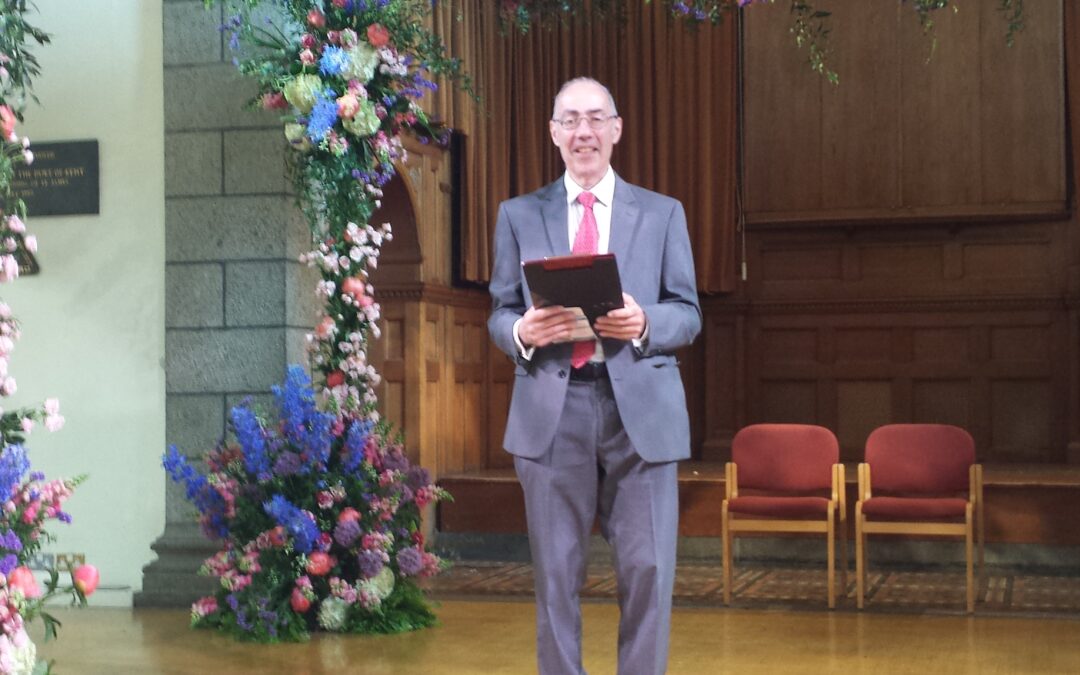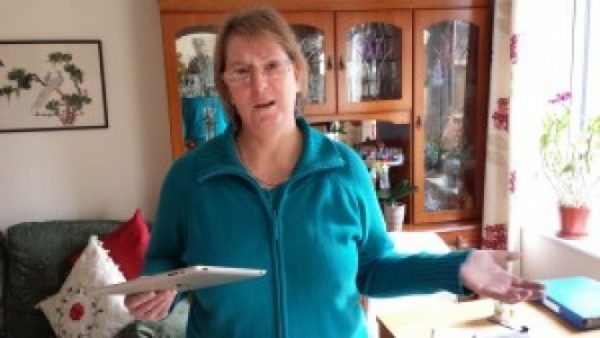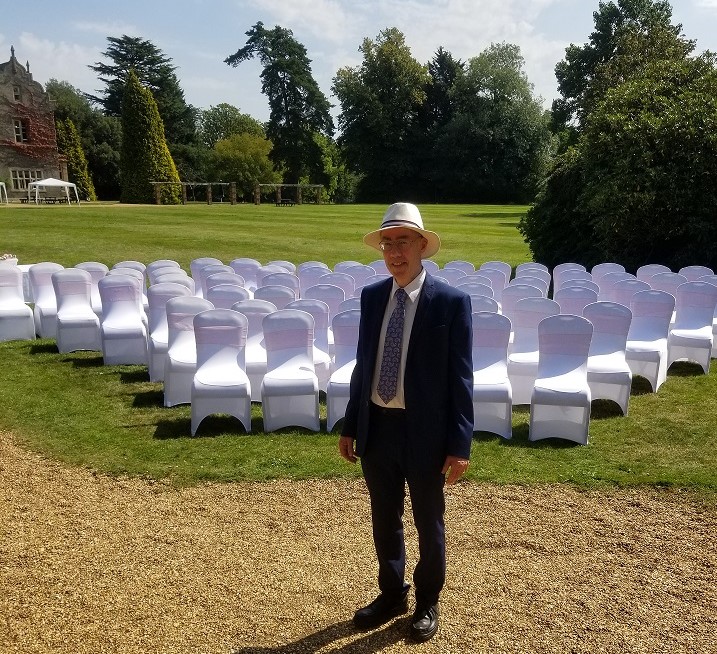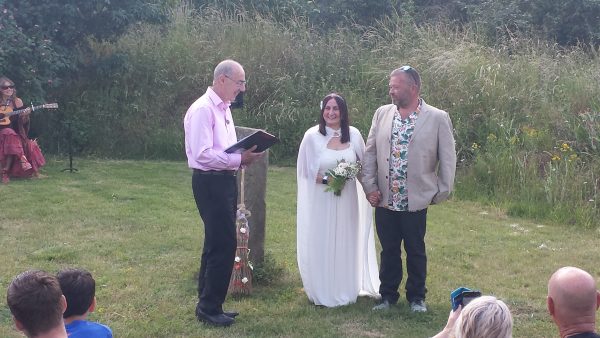
by Michael | Apr 20, 2021 | Blog
I’m often asked what is my role. How can I conduct a wedding? Surely, that’s got to be either a priest (or equivalent) or else the registrars?
What people often don’t realise is that those are not the only options.
As we’ll find out, there’s also a civil celebrant (like me!) who can do the job.
Religious
If you opt for a full religious service in England & Wales, then of course you go to your church (or equivalent). They will explain all that’s involved. Not every branch of Christianity is catered for here, though. Church of England, Quaker or Jewish are the only types of religion included.
For other sects, you can marry in a non-C of E church (say), but the marriage will not be legal until you have made an appointment and been to the Register Office. Without the registrars’ participation and the pronouncing of certain words, you will not qualify as legally wed.
Civil
If you choose the civil route, you need to know that the service must be totally non-religious. You can be sure that it will be a totally secular ceremony, even though the content may vary a bit from registrar to registrar.
The Register Office service will cost in the region of £100. Pre-COVID, they could come out to a venue licensed for weddings, albeit for another £500 or so. As I write, this is no longer possible, and, anyway, wedding numbers are still limited severely.
Celebrant
There is another option, however, which all too few people know about. It is particularly useful if:
- You may not want a full religious service
- You may want one, but are prevented from marrying in your church/synagogue etc. For example, you are a (Catholic) divorcee or yours is a mixed-faith ceremony
- You (or even your parents!) want to have just a smidgen of religion in your service
Note that, a humanist celebrant, like the registrars, will not allow any religious references. So go for an independent celebrant, and you can enjoy a personalised ceremony with as much or as little religion as you want.
Again, this is not a legal ceremony, so you still have to go to the registrars. Afterwards, you can enjoy the ceremony you actually want, compiled and conducted by your civil celebrant. It can be in the venue of your dreams, and, to all intents and purposes, be your actual wedding. It can reflect your personalities and beliefs, with inspiring spiritual – or even funny – readings, and contain personalised sections, such as self-written vows.
So don’t go thinking that your big day can’t be the way you want it! Because it can!
Have a chat with me, and I’ll show you how.

by Michael | Apr 12, 2021 | Blog
No. I know it’s not Halloween, but this is all about nightmare scenarios!
The following have happened at (or before) weddings that I was officiating at:
- A fire
- The groom forgot the ring
- The bride’s car got lost
- A staircase collapsed
- A photographer fell over backwards
- The Best Man arrived two hours late because of a job interview
Of course, there’s virtually no limit on what might go wrong. Usually, nothing does, and, if something does go awry, most people don’t even notice!
That won’t stop most brides and their team worrying, though.
Solutions
You can use a wedding planner. You pay them to take the burden off your shoulders. And experienced ones are good at improvising solutions. It doesn’t have to cost that much, either. They offer packages, so you can hire a planner for the day only, if that’s all you want.
But what if you’re doing it yourself?
You have to prepare properly. Do your homework before booking professional suppliers (celebrants, venue, florists, DJs, photographers, make-up artists, caterers, the bridal car, and so on). Make sure you ring round the week before the wedding and confirm they do have your reservation on their books!
Good for your peace of mind, at the very least – and suppliers are human too!
If something does go wrong, don’t panic. Your team will rally round. If the problem is major, guests will show tolerance. Some may tut a bit, but most will understand. Nobody complained when our service was delayed because of a fire!
So relax and enjoy your big day, secure in the knowledge that you have prepared well and have a fine team on side. Don’t look at the dark side and assume the worst. Relax and everything will flow sweetly. You’ll have an unforgettable day – and for the right reasons!

by Michael | Mar 23, 2021 | Blog
Do we even need wedding suppliers these days? After all, with social distancing and government regulations limiting the size of ceremonies, we’ve moved towards small-scale ceremonies.
Can’t we manage on our own now?
Maybe, but I would be less than sanguine as soon as the guest-list goes into double figures. (hopefully, next month!)
DIY
If you’re doing it yourself, you can easily go to the Cash & Carry and buy in a load of food and drink. Oh, you’ll probably want to clean your front room up first before putting up the ribbons and bunting. How will you serve refreshments? How will you arrange the room to accommodate a relatively large number? Are you using the back garden? Supposing it rains? Have you warned the neighbours? Will there be a sound system? Have you avoided trailing wires and trip hazards?
So, rather than exhaust yourself before the event even starts, it may be wiser to hire some professional suppliers.
Wedding Planner
Even if circumstances don’t change, then consider a professional wedding planner. Given their contacts with suppliers, they may work out cheaper than you envisage!
Otherwise, there may be an event planner who comes with the venue you book. Of course, if you’re confident you can handle it – go for it yourself.
Venue
Visit venues until your heart says “yes”. Obviously, the price must be right and you must feel happy about the planner there.
Be aware that you may have to give the venue a lot of notice.
Ceremony
You may not be having a full religious service. However, you may want more than the Registrars’ standard ceremony. They do the legal bit, but they do not personalise. For that, contact a civil celebrant.
Civil Celebrants
Working together with your civil celebrant, you can achieve the unique ceremony of your dreams.
If current law proposal proceeds, soon the celebrant may actually be able to conduct a personalised, but fully legal, ceremony at one and the same time.
Musicians and Entertainment
You may want music, either at the wedding ceremony or at the reception (or both). Decisions to make include whether it should be live or recorded, and whether you’re having a DJ or a friend to push a button.
Make sure you know who is providing the sound equipment.
Catering
Again, this is where a planner can earn their keep. Are you having some drinks and hors d’oeuvres before the meal? Will the meal be buffet or silver service? What – and how much – drink will you offer? Will you have a cash bar? What about vegans and those on gluten-free or dairy-free regimes? Do you want a special table for children?
Photographers
Don’t neglect a photographic record of your big day. How many photographers – or videographers – you have is down to you. Don’t ask a friend to do it (even though you save money): he/she may accidentally fail to deliver, which you really wouldn’t thank them for. Moreover, the friend is there to be part of your wedding, not to worry about the pictures.
Florists
Most of us want flowers at such an occasion – seasonal ones are usually cheaper than ones flown in.
There may well be other suppliers you’d want to employ (such as drivers, cake-makers, magicians), but I hope that this article gives at least a reasonable idea of what may be involved in planning a wedding.
It may look daunting, but professional suppliers can manage it smoothly for you.
If you have any questions or comments, especially about ceremonies, please feel free to contact me.
by Michael | Feb 9, 2021 | Blog
Whether or not you are planning a micro-wedding or still hoping for a bigger one, you are likely to be looking for a supplier or two. Simple examples would be a photographer, florist or a civil celebrant.
How do you know they’ll be any good, and what do you need to ask them, so you can judge?
Ideally, you’ll have positive first-hand experience. Or else the suppliers come with a recommendation from someone you trust who has used them. We had our reception in the same place as an aunt and uncle’s golden wedding celebration, so we knew the venue could offer just what we were looking for.
What do you do, if none of your acquaintances can recommend anyone? Maybe your FaceBook contacts can help. If not, I’d advise you to Google your supplier(s) and have a look at their website.
The main thing you are looking for is whether they can offer the particular service you desire. In these trying times, you may also want to see their cancellation policy too.
If you like what you see, check out testimonials. Are customers happy with what you are after and does the supplier provide it the way you want it?
If it still looks good, make contact, preferably face-to-face or on zoom or Skype. Have questions ready. Availability is the first question, of course. “How much?” is important, but less so than whether the supplier will listen to, and can share, your vision.
Ask for (and then read!) the Ts & Cs.
If all tallies, then don’t forget this one: do you actually trust, like and want to work with this supplier? I usually tell my brides and grooms only to go with me, if they feel happy at the thought of being married by me.
So, go with your heart, once your head is satisfied!
To discuss this further, please contact me for a chat.

by Michael | Nov 10, 2020 | Blog
A Civil Celebrant can play an immense part in the success of a ceremony. But not everybody understands how to get the best from one.
The first misconception is that a civil celebrant is the same as a wedding, or event, planner. No, it’s not!
Wedding Planners
The planner’s job normally includes booking the venue and organising suppliers. Examples include florists, caterers, photographers, make-up artists, musicians, entertainment, and decor. Then they supervise the day itself.
Those are rarely, if ever, the brief of a civil celebrant. Our role on the day is confined to the ceremony only (although that can be responsibility enough!).
Civil Celebrants
People are not always aware that we do more than just show up on the day. One thing a civil celebrant does (in common with the planner) is to put in a shift or two well before the wedding day itself.
The hidden bits
The process usually begins with an initial conversation (pre-COVID, face-to-face or, now, on Skype or Zoom). The idea is to establish a picture of what the client wants (and what is practical) and to see if a working relationship is viable.
Then the civil celebrant will put in research, as a draft ceremony is prepared, and plenty of writing. Once the draft is ready, it will be e-mailed for the client’s approval. Then there’ll be further contact. Tweaks are often made before the final version is agreed.
Well before the big day, the couple will have agreed with the celebrant the exact text of the ceremony. Thus no unpleasant surprises will lie in store. Their dream ceremony is ready.
On the Day
The one part of the day the wedding planner has no control over is the conducting of the actual ceremony. And that’s the celebrant’s big moment.
On the day, our role is to conduct the ceremony. Very occasionally, we are around for other parts (canapes, ‘breakfast’, even the reception). We can be asked to co-ordinate events like a toastmaster, but that is not the job specification of a regular Civil Celebrant.
The bit of the job of a celebrant that the public sees is on the day itself. Ideally, we arrive at the venue in very good time, check all is set up correctly, make contact with the major players (event planner, couple’s family, musicians, photographer, etc.) , meet the ‘team’ (eg Best Man and ushers etc.) and calm the Groom down! If possible, we let the bride know we’ve arrived.
Then we’re in charge of the ceremony. We conduct it from the ‘front line’ calmly, clearly, professionally and with humour (as appropriate). We co-ordinate with the other ‘actors’. We ensure the couple are at their ease. We have to be ready to react suitably to the unexpected (you’d be surprised!), and make the ceremony memorable, enjoyable and special for all concerned.
The public part of what we do only extends to the half-hour (or so) ceremony, plus the hour beforehand. But plenty of homework goes in earlier to produce the desired result.
And that’s what a civil celebrant can do for you!
Feel free to have a chat to find out how a personalised ceremony can work for you.




